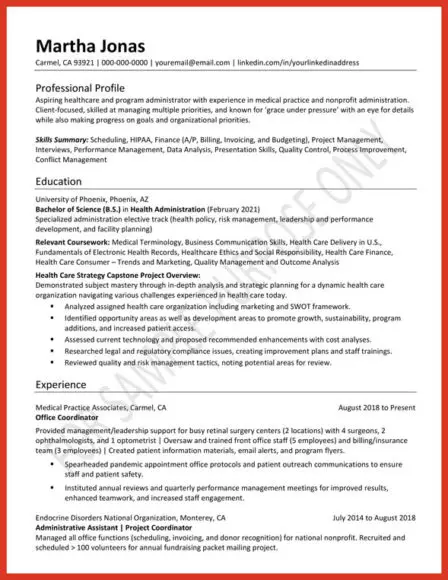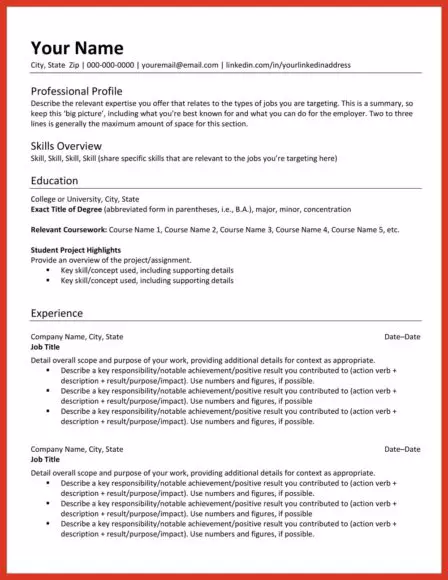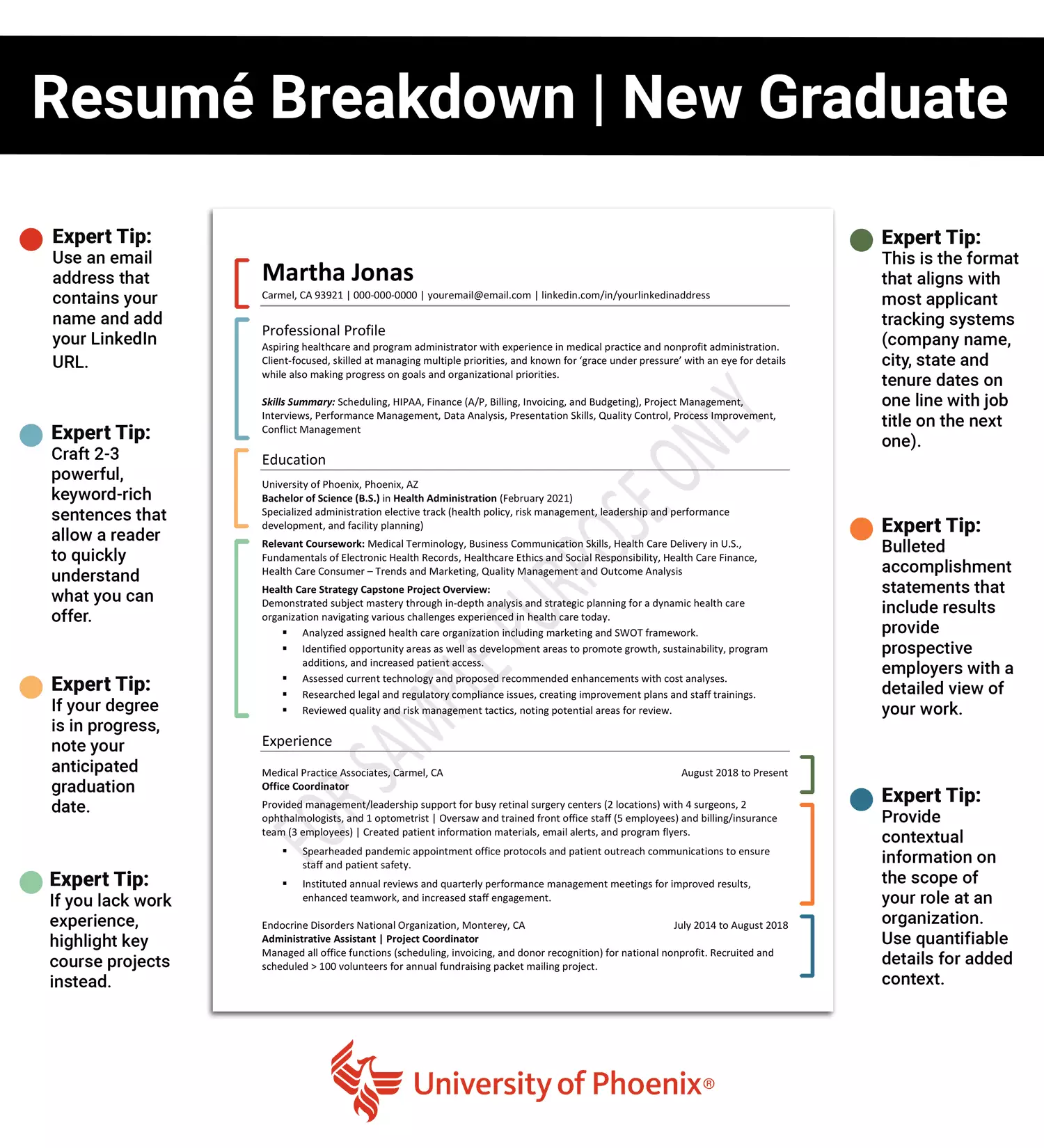Writing a recent college graduate resumé, and template

Written by Lilia Ortiz

Reviewed by Jessica Roper, MBA, director of Career Services at University of Phoenix
Fresh out of college? Then you’re probably going through a lot of different post-graduate emotions . Happiness, excitement, pride, sadness and maybe even dread. That’s completely normal! Everyone experiences that "now what?" feeling the day after graduation. Here's how to take action with a resume tailored especially for recent graduates.
Composing your first recent college graduate resume
Fortunately, when you’re a new college graduate, anything is possible, including putting together your first recent college graduate resume. Unfortunately, when you’re a new college graduate, anything is possible. This looming expanse known as "the future" can leave you feeling overwhelmed and lost.
One of the first challenges you’ll face during the job hunt post-graduation is writing a college graduate resumé . Read on to learn how to write an impressive resumé when you’re a new grad. No experience necessary!
Getting ready to write your resume, step-by-step
Job searching is a lot like dating. You not only need to know what you want in a job, but you also need to know how to present your resumé in a way that shows who you are and what you have to offer.
Come up with a strategy
Job searching is a lot like dating. You not only need to know what you want in a job, but you also need to know how to present your resumé in a way that shows who you are and what you have to offer.
And so, as with most things in life, you’ll need a strategy. Make the process of writing a college graduate resumé easier by doing your research and determining your target audience.
Another reason to have a strategy is that most employers will take 10 seconds or less to look over a resumé. So go in with a plan of attack by including a professional profile at the top of your resumé. This section should describe your relevant experience and target the job you’re applying for, as well as list any related skills.
Don't limit yourself
As a new college graduate, you might think that your lack of experience puts you at a disadvantage. However, that couldn’t be further from the truth.
Work experience isn’t the only thing you can highlight on your resumé. You can and should include your achievements as a student (such as projects, presentations, internships, or a GPA above 3.0). After all, that’s your most recent experience as a new grad.
Consider also including volunteer experiences, relevant hobbies that showcase your talents, coursework that reflects your newly gained knowledge and military skills that can easily translate to the civilian workforce . Just remember to protect yourself from potential discrimination by not mentioning your age, gender or political or religious affiliations — and don’t include a photo.
Take advantage of internships and include them in your resume
Internships are your best friend when writing a resumé as a recent college graduate. In fact, Indeed.com stresses that new graduates can use this experience to highlight their qualifications in their college graduate resumé. Additionally, Indeed says, "Previous internship experience helps you demonstrate during your next opportunity that you are committed to gaining professional knowledge and you have gained the expertise to help you in the position."
And the numbers bear this out. The National Association of Colleges and Employers’ 2024 Internship & Co-op Survey Report found that 66.6% of the interns surveyed received a job offer.
But what if you graduated with no internship experience? Don’t fret! It is possible to find an internship opportunity even after graduation . An internship is excellent for gaining experience in your chosen field and for building connections.
And who knows? Your internship could even turn into an offer for a full-time job.
Build your professional relationships
While a resumé is important, networking is also a large part of the equation. In other words, applying for a job doesn’t have to be limited to online job boards. You should also focus on building relationships through LinkedIn, joining a professional association affiliated with your field of interest and by attending networking events, says Johnson.
She continues, "If you haven’t done an internship or need to gain experience, start working on that network." Reaching out to those you know is a great stepping stone to broadening your network. Furthermore, great connections can more than make up for your lack of experience in the workforce if they can vouch for you when the perfect opportunity presents itself.
Focus on staying positive
It can be hard to keep your chin up during your job search when weeks turn into months. And, when the competition is fierce, it’s easy to believe that as a new college graduate you have less to offer. Johnson reminds recent grads to try to remain positive and stay focused on what they do have to offer. Comparison is the thief of joy after all and, in Johnson’s own words, "no one is unemployable."
Recent college graduate resume example to download
Putting your recent college resume together
Now that you know what to include in your resumé, it’s time to start putting it all together. If it’s easier, you can start by outlining the first draft on paper. That way, you don’t worry about the digital format while you get your ideas down.
Include action words and numbers
Once you’ve jotted down all your information, check that you’ve included action words , and used numbers and figures whenever possible to describe an achievement in a quantifiable way, stating the positive result(s) of said success.
Use the right keywords and format to get through ATS
After typing up your resumé, you can use Jobscan.com to check that you used the right keywords to match the job description. The website optimizes your resumé to ensure it is getting past an Applicant Tracking System (ATS), which analyzes resumés to select the best candidates for a position. The algorithm can reject even a highly qualified applicant if their resumé doesn’t contain the right keywords.
Similarly, some designs can confuse an ATS, so it’s best to use a traditional format for your resumé that’s simple and easy to read. And, finally, keep your resumé to one to two pages.
Find more resources to help with your recent college resume
Need assistance with your recent college graduate resume, or any other career guidance? Active students and graduates of University of Phoenix have lifelong access to its Career Services for Life® commitment , including helpful career resources including resumé building tools, career advisor appointments and more.
Contact University of Phoenix to find out more .
Read more articles like this:

ABOUT THE AUTHOR
Lilia Ortiz is a writer and artist whose creative journey has been shaped by an appreciation for the beauty inherent in the ordinary. She earned her Bachelor of Arts in English literature from Arizona State University in 2013 and a degree in graphic design from Phoenix College in 2018. Her unique approach to visual design intertwines the tangible with the intangible: She weaves together words, thoughts and ideas with texture, color and pattern. Each result is a testament to the storytelling possibilities that emerge from the convergence of literary and visual arts. She lives in Buckeye, Arizona with her husband, Adam, and dog, Pinto.

ABOUT THE REVIEWER
Jessica Roper, University of Phoenix director of Career Services, is a seasoned leader with over 15 years of experience in leadership within higher education. She has honed her expertise in student services and career development and is passionate about helping others discover and refine their skills.
This article has been vetted by University of Phoenix's editorial advisory committee.
Read more about our editorial process.






